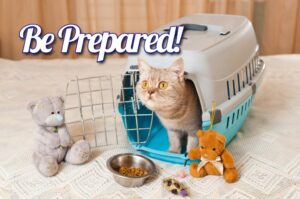The Vet is In:
More Than Just a Motto – Be Prepared
We all watched with unimaginable horror the recent fires in Hawaii and, of course, immediately thought of evacuating with our own pets. The idea is painfully unthinkable, but if we do everything we can ahead of time, we stand a real chance to save them. With so many disasters seemingly happening all at once, we can’t do too much to prepare.
Make sure all animals are microchipped to be more easily reunited should they get lost in an emergency. Research in advance what emergency housing or shelters accept pets. Keep a picture of you and your animals together so that you can prove your connection if other means of identification are unavailable.
Keep up-to-date veterinary cat records in a waterproof sealed plastic bag and in a cat carrier ready to use immediately. Keep dog records the same way with your personal emergency items to take. If your dog can be crated, that is a better option and records should be kept in the crate.
 Have all veterinary medicine ready to go in a sealed container as well, with instructions. Bring a few days’ supply of food, kitty litter, and bags to clean up after your dog.
Have all veterinary medicine ready to go in a sealed container as well, with instructions. Bring a few days’ supply of food, kitty litter, and bags to clean up after your dog.
Make sure that all tags have full identification on them. If your cat does not wear a collar inside, have it attached to the carrier ready to go when you need it.
Your veterinarian may be closed in an emergency situation so keep duplicate health records — not in your phone, which can get lost or ruined — but with a trusted person in case your originals are separated from your pet. But do attach your vet’s name and number to any collar, crate, or leash as appropriate.
Also, with your animal’s info, add an emergency contact outside the impacted area in case your animal gets separated from you and rescuers can’t reach you.
Depending on where you live, check with your equine practitioners or farm vets to decide what the best course of action would be to take care of barn animals. Acclimate your horses to having a towel or covering over their eyes if they need to be moved since they are not likely to be easily led when they’re frightened or facing a strange situation. Have coverings for this handy in your tack room.

Listen for emergency warnings and if advised, evacuate ahead of a disaster. In NY, a law allows household pets to be carried on public transportation during an emergency.
Do all that you can to project a soothing demeanor so that your panic does not worsen your companion’s. Pets cannot plan for themselves and are depending on us to be responsible for them. Given their loyalty to us, we owe them all the protection we can.
NYSHA’s VP, Dr. Holly Cheever, is a partner in a small animal practice, the Village Animal Clinic, in Voorheesville, NY. She sits on several boards for animal issues, is a speaker and consultant across the nation, and has testified before Congress about animal abuse in circuses, as well as in New York City regarding the carriage horse trade.
New York State Humane Association Humane Review, Vol.XLII, Fall 2023.